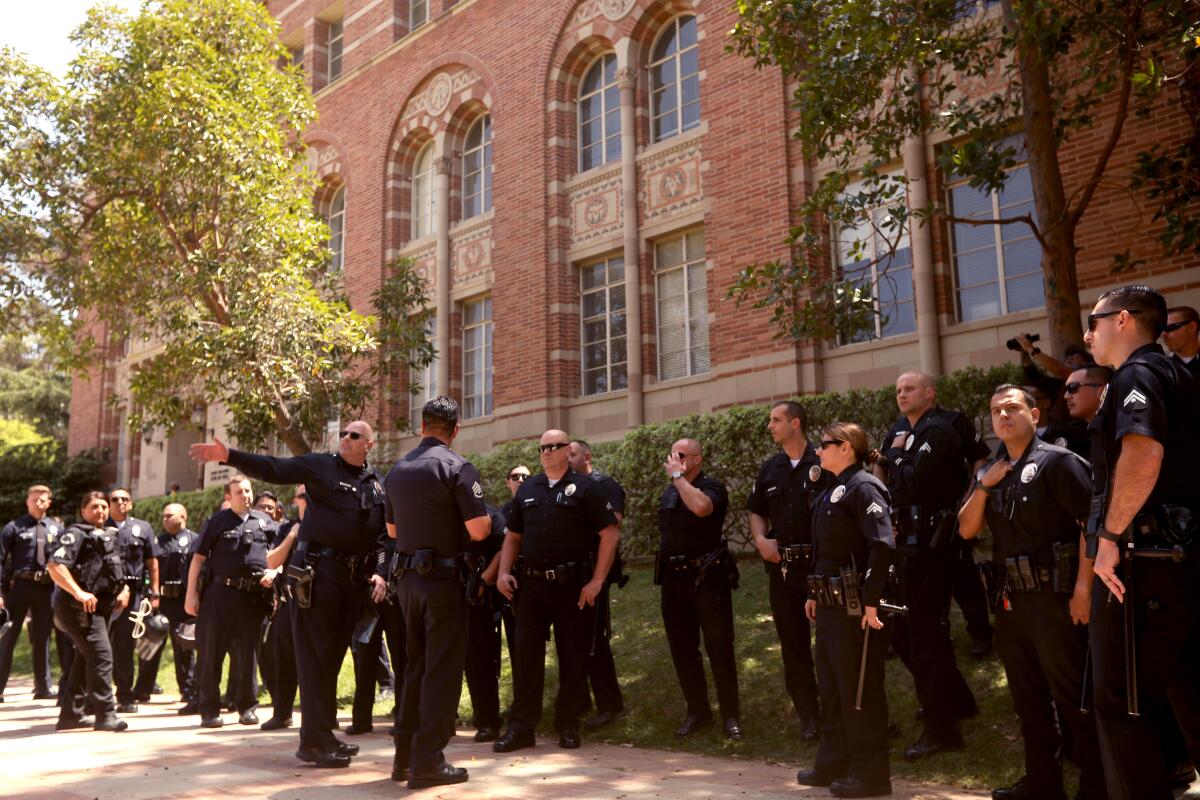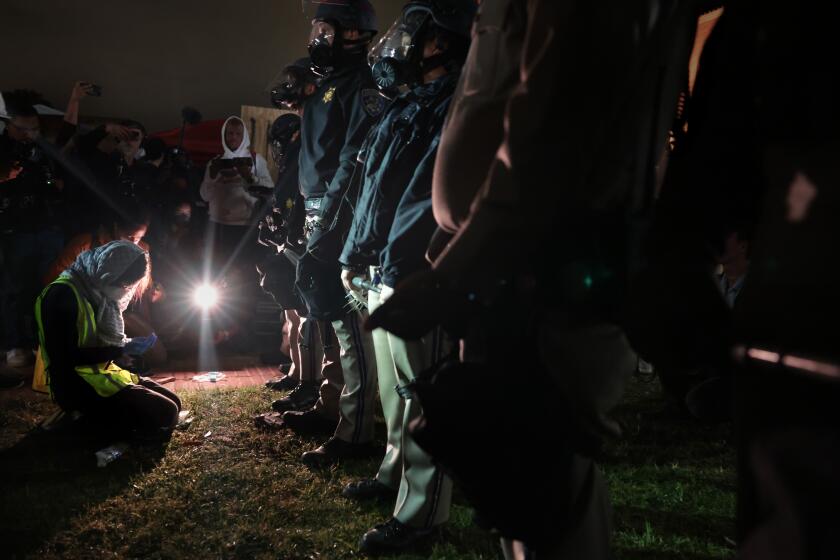UCLA sought extra police but canceled requests in days before protest camp was attacked

Five days before pro-Israeli counterprotesters attacked a pro-Palestinian camp at UCLA, the university Police Department asked other campuses for additional police, according to the head of the UC police officers union.
But the requests — which would have provided UCLA with more police officers as they dealt with the camp and a dueling area erected by pro-Israeli activists — were both quickly canceled, according to internal communications reviewed by The Times.
UCLA officials did not respond to a request for comment about the cancellations.
The requests for additional police resources add to the questions about why UCLA was so underprepared when dozens of people swarmed the pro-Palestinian camp Tuesday night and Wednesday morning, attacking protesters who were occupying the space on the campus.
Law enforcement sources said there were only a handful of UCLA officers on duty at the time, and they were quickly overwhelmed. It would take hours for officers from the Los Angeles Police Department, the California Highway Patrol and other agencies to arrive and stop the violence.
Less than 24 hours after a violent attack on a pro-Palestinian camp at UCLA, officers pulled apart barricades as they tore down the encampment and made arrests.
UCLA’s handling of the upheaval is now the subject of an external review by the University of California and has been roundly criticized.
Wade Stern, an officer at UC Riverside and the president of the Federated University Police Officers’ Assn., told The Times that the mutual aid call would have allowed for members of UCPD’s Systemwide Response Team — a group of about 80 officers across the portfolio of schools known as the SRT — to deploy to UCLA. The request would have placed the extra officers on campus from Sunday to Tuesday, Stern said.
“We’ve all been trying to get up there and go help,” he said.
Photos: Clashes erupt at pro-Palestinian demonstrations on California campuses
The two requests for mutual aid were made Thursday and Friday, but both were canceled within a few hours, according to documents reviewed by The Times. UCLA requested and received aid on Sunday to deal with counterprotesters at the camp.
The request for mutual aid was not sent out again, despite the fact that SRT members were standing by, ready to head to UCLA, Stern said.
It’s not clear how many more officers UCLA would have received or whether the additions would have been enough to prevent Tuesday’s violence.
But the university is already facing scrutiny over the way it handled the incident.
Many on campus and outside UCLA are criticizing the university for not handling the violent counterprotest better.
“The limited and delayed campus law enforcement response at UCLA last night was unacceptable — and it demands answers,” a spokesperson for California Gov. Gavin Newsom said in a statement Wednesday.
When camps started popping up on college campuses, UC took a lighter touch in handling protests than USC, Columbia and other campuses that have called in police, who have arrested hundreds of people, many of them students.
But on Tuesday, hours before the camp was attacked, UCLA declared the gathering “unlawful.” On Thursday morning, hundreds of CHP officers moved in and disassembled the camp, arresting more than 200 people.
The SRT is little-known but is a key tool for the 10 small police departments at the UC schools. UCLA Police Chief John Thomas called his force “underemployed” in a February interview with the Daily Bruin. He has 65 officers, whereas when he was the chief at USC across the city, he had 300. Thomas said that UCLA needed about 15 more officers than it had on staff.
A request for mutual aid through the SRT has to be made by the host university’s chief of police, according to the UC police procedures manual.
People across Gaza sent thanks to students protesting on U.S. campuses against Israel; Israeli leaders characterized the demonstrators as ‘pro-Palestinian mobs.’
Thomas did not immediately respond to a request for comment.
Stern’s union put out a statement Wednesday noting that the police departments across the UC system take their orders from the chancellors of the schools.
“When protests erupt on campus, the decisions regarding the response of the UC Police rest firmly in the hands of campus leadership,” the union said in a statement.
The union noted the difference between “operational execution,” which was under the departments, compared to “strategic direction,” which was controlled by the school administrators, according to the statement.
On Thursday, UCLA Chancellor Gene Block said in a statement the university’s approach to the encampment was guided by the need to support the safety and well-being, as well as the free expression, of its students coupled with the need to minimize teaching and learning disruptions.
“When physical violence broke out [Tuesday] night, leadership immediately directed our UCPD police chief to call for the support of outside law enforcement, medical teams and the fire department to help us quell the violence,” Block said.
More to Read
Sign up for Essential California
The most important California stories and recommendations in your inbox every morning.
You may occasionally receive promotional content from the Los Angeles Times.














